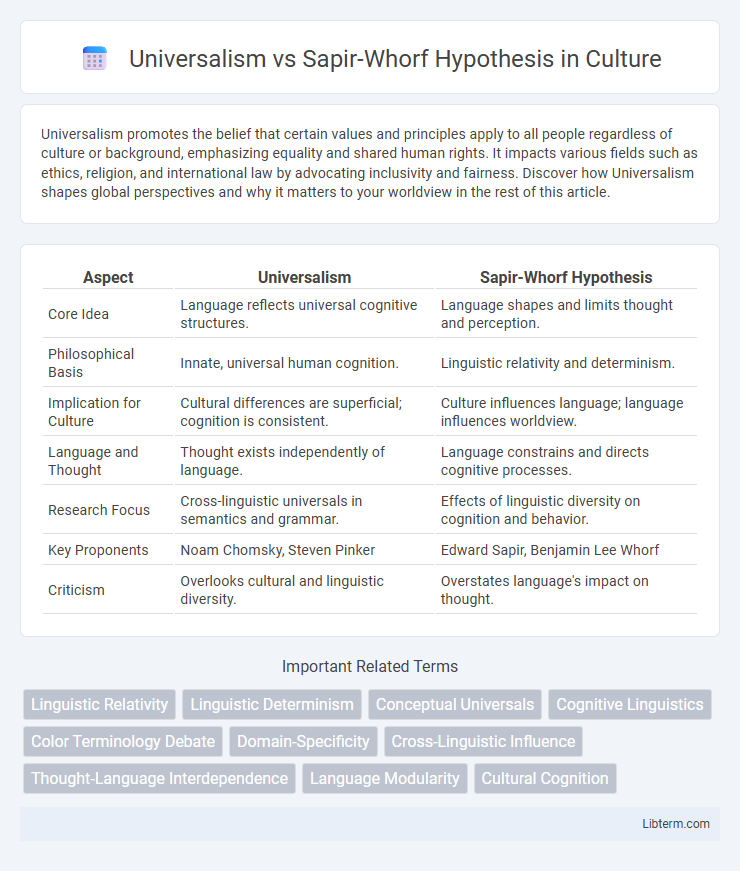Universalism promotes the belief that certain values and principles apply to all people regardless of culture or background, emphasizing equality and shared human rights. It impacts various fields such as ethics, religion, and international law by advocating inclusivity and fairness. Discover how Universalism shapes global perspectives and why it matters to your worldview in the rest of this article.
Table of Comparison
| Aspect | Universalism | Sapir-Whorf Hypothesis |
|---|---|---|
| Core Idea | Language reflects universal cognitive structures. | Language shapes and limits thought and perception. |
| Philosophical Basis | Innate, universal human cognition. | Linguistic relativity and determinism. |
| Implication for Culture | Cultural differences are superficial; cognition is consistent. | Culture influences language; language influences worldview. |
| Language and Thought | Thought exists independently of language. | Language constrains and directs cognitive processes. |
| Research Focus | Cross-linguistic universals in semantics and grammar. | Effects of linguistic diversity on cognition and behavior. |
| Key Proponents | Noam Chomsky, Steven Pinker | Edward Sapir, Benjamin Lee Whorf |
| Criticism | Overlooks cultural and linguistic diversity. | Overstates language's impact on thought. |
Understanding Universalism: The Theory Explained
Universalism posits that cognitive processes and language reflect innate, universal structures of the human mind, independent of cultural and linguistic differences. This theory, grounded in cognitive psychology and linguistics, suggests that all humans share a common conceptual framework, allowing for shared meanings across diverse languages. In contrast to the Sapir-Whorf Hypothesis, Universalism emphasizes inherent mental categories over linguistic relativity in shaping human understanding.
Overview of the Sapir-Whorf Hypothesis
The Sapir-Whorf Hypothesis posits that language shapes thought and perception, asserting that linguistic categories influence cognitive processes. It challenges the notion of universal human cognition by emphasizing the variability in how different cultures perceive reality through language. This hypothesis is divided into linguistic relativity, which suggests language influences thought, and linguistic determinism, which argues that language limits cognitive ability.
Key Differences Between Universalism and Sapir-Whorf
Universalism argues that cognitive processes and categories are innate and universally shared across all human languages, while the Sapir-Whorf Hypothesis posits that language structure directly influences cognitive patterns and worldview. Universalism emphasizes commonalities in human thought regardless of linguistic differences, whereas Sapir-Whorf stresses linguistic relativity, suggesting that speakers of different languages perceive reality differently. The key difference lies in universalism's assumption of language-independent cognition compared to Sapir-Whorf's assertion that language shapes thought and experience.
Language and Thought: Competing Perspectives
Universalism argues that cognitive processes and perception are fundamentally shaped by innate, universal biological mechanisms, suggesting language reflects pre-existing thought structures. The Sapir-Whorf Hypothesis asserts that language fundamentally influences or determines the way individuals perceive and conceptualize reality, emphasizing linguistic relativity. These competing perspectives highlight the ongoing debate on whether language shapes thought or thought shapes language, with empirical studies on cross-linguistic cognition providing critical insights.
Evidence Supporting Universalism
Cross-linguistic studies reveal shared cognitive patterns in color perception and spatial reasoning, supporting universalism's claim of innate mental structures. Neurological research identifies consistent brain activation areas during language processing across diverse populations, indicating a common neurocognitive basis. Psycholinguistic experiments demonstrate that children acquire grammar rules in similar stages worldwide, reinforcing the universality of linguistic development mechanisms.
Evidence Supporting Sapir-Whorf Hypothesis
Evidence supporting the Sapir-Whorf Hypothesis includes studies demonstrating how language shapes cognitive processes, such as color perception differences found between speakers of languages with varying color terminologies. Research on spatial orientation reveals that certain indigenous languages encode direction differently, influencing speakers' navigational skills and spatial memory. Neurolinguistic experiments further highlight how language structure affects thought patterns, reinforcing the idea that linguistic relativity shapes mental frameworks across cultures.
Cross-Linguistic Studies: Insights and Challenges
Cross-linguistic studies reveal that Universalism asserts shared cognitive structures across languages, while the Sapir-Whorf Hypothesis emphasizes language-specific thought patterns shaping perception. Examining diverse languages uncovers varying semantic categories, challenging the universality of cognitive processes and highlighting linguistic relativity in categorization and memory. These insights expose methodological challenges such as controlling cultural variables and disentangling language influence from cognition in cross-linguistic research.
Implications for Cognitive Science and Linguistics
Universalism posits that cognitive structures are innate and shared across all humans, suggesting language reflects universal thought patterns, while the Sapir-Whorf Hypothesis argues that language fundamentally shapes and constrains cognition. This dichotomy influences cognitive science by informing research on whether cognitive processes are pre-linguistic or language-dependent, impacting theories of perception, memory, and categorization. Linguistics benefits from this debate through insights into language relativity and universality, affecting approaches to language acquisition, syntax, and semantics.
Criticism and Controversies: A Comparative Review
Universalism faces criticism for underestimating cultural and linguistic diversity, often overlooking how language shapes thought processes uniquely within different societies. The Sapir-Whorf Hypothesis, while emphasizing linguistic relativity, is contested for its weaker empirical support and the challenge of clearly distinguishing language influence from cognitive universals. Comparative reviews highlight ongoing debates concerning methodological rigor and the extent to which language constrains or merely influences cognition, reflecting polarized academic perspectives on language and thought interdependence.
Universalism vs Sapir-Whorf: Modern Perspectives and Future Directions
Universalism argues that cognitive processes and perceptions are innate and shared across humanity, while the Sapir-Whorf hypothesis posits that language shapes thought and cultural experience. Contemporary research emphasizes a nuanced interaction between innate universals and linguistic relativity, exploring how language influences but does not rigidly determine cognition. Future directions highlight interdisciplinary approaches involving cognitive science, linguistics, and neuroscience to further elucidate the dynamic interplay between universal cognitive structures and language-specific effects.
Universalism Infographic

 libterm.com
libterm.com